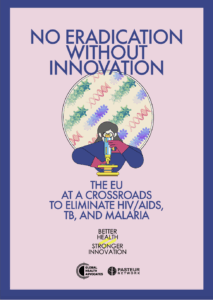 For over two decades, the global fight against HIV/AIDS, tuberculosis, and malaria has been one of humanity’s greatest public health achievements. Scientific innovation and international solidarity have brought us from the brink of despair to a point where eradication is no longer a dream, but a real possibility.
For over two decades, the global fight against HIV/AIDS, tuberculosis, and malaria has been one of humanity’s greatest public health achievements. Scientific innovation and international solidarity have brought us from the brink of despair to a point where eradication is no longer a dream, but a real possibility.
Our new report, developed with Pasteur Network, entitled No eradication without innovation: the EU at a crossroads to eliminate HIV/AIDS, TB, and malaria underscores how decades of investment in research and development (R&D), coupled with global cooperation, have saved millions of lives and how we now stand at a critical crossroads.
25 years of groundbreaking innovation, but progress is now under threat
In the early 2000s, HIV/AIDS, TB, and malaria were among the deadliest diseases on the planet, ravaging communities and devastating the world’s most vulnerable populations. Since then, advances in medical science, fuelled by public and philanthropic investment, have delivered game-changing tools to prevent, detect, and treat these diseases. Thanks to initiatives like the Global Fund and Unitaid, these tools have been delivered on a large scale to the people who need them most.
However, this progress is under threat. The rise of anti-science rhetoric, political inwardness, and declining support for global health initiatives risk undoing decades of progress. Complacency could bring about a deadly resurgence, returning us to a time when these diseases reached epidemic proportions.
The EU at a crossroads
We call on the European Union to double down on its commitment to global health. As a hub of scientific excellence and a champion of multilateralism, the EU must lead by example to ensure that innovation continues and that its fruits reach those most in need.
The EU must increase its investments in poverty-related and neglected disease R&D.
- The EU’s future research programme – Horizon Europe/FP10 – must have an ambitious budget of €200 billion, with at least 10% dedicated to health.
- The EU must strengthen R&D collaboration with low- and middle-income countries. Programmes like EDCTP3 have proven to deliver and must be continued in the next budget cycle.
- The EU must guarantee the accessibility and affordability of tools developed using European public funding, by including clear access provisions to EU R&D funding and by facilitating technology transfers.
The EU must reaffirm its support for multilateralism in health
- The EU must increase its support to the Global Fund by pledging €800 million to its eighth replenishment.
- The EU future external action instrument – Global Europe – must allocate at least €200 billion to ODA, and ensure health remains a key priority area of international cooperation.
About the authors
The Pasteur Network is an alliance of 32 institutes spanning 25 countries across 5 continents, fostering a dynamic and diverse community of knowledge and expertise.
Global Health Advocates is a French NGO whose mission is to carry out political advocacy in France and with the EU institutions to ensure policies and resources are effectively addressing health inequalities



